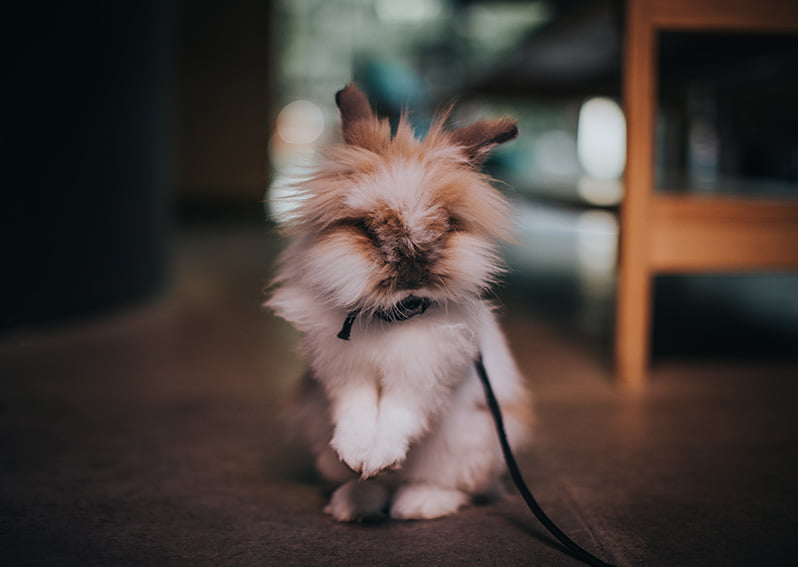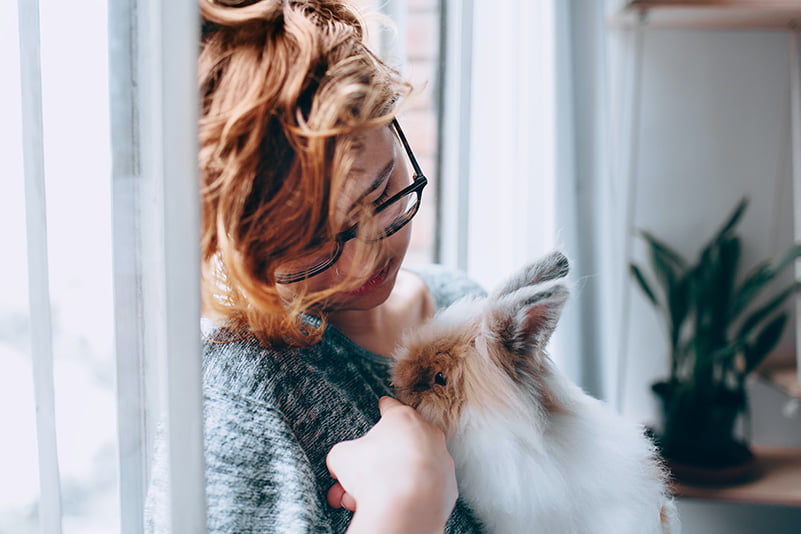The Lionhead rabbit originated in Belgium and is a cross between a Swiss Fox rabbit with a Netherland Dwarf rabbit. This rabbit breed was first introduced to the United States in 1998 and was not recognized by the American Rabbit Breeders Association (ARBA) until 2014. This means you can enter your Lionhead rabbit into a competition!
With the genetic mutation of the mane gene, which causes wool to appear around the rabbit's head and on the flakes, this appearance makes lionhead rabbits an adorable pet. While lionhead rabbits sure are cute, these fluffy bunnies will require just as much love and attention as any other house pet. If you're a first-time bunny owner, you'll want to make sure you're fully prepared to take on the responsibilities of owning a new pet before you commit to buying one.
In this lionhead rabbit care guide, we'll break down everything you need to know about purchasing, feeding, and caring for your new pet rabbit!
How to Care for a Lionhead Rabbit
Like any house pet, it'll require a bit of love and attention to keep your rabbit healthy and happy. But, don't worry! These adorable pet rabbits are surprisingly easy to care for— even if you're a first-time bunny owner.
Before purchasing a new pet, you'll need to seriously consider if you're prepared to take on the responsibilities that come with being a pet parent. Can you afford to pay for food, vet bills, and other expenses? Do you have time to groom your rabbit regularly? Is a rabbit a practical pet for your living situation? Rabbits live for quite a few years, so you'll want to be sure you're truly ready to commit.
Diet
Diet plays a major role in determining the lifespan of your lionhead. One of the most important things you can do for your bunny is to feed it a healthy, balanced diet full of high-quality, nutritious foods. Like other rabbits, lionhead rabbits thrive on a diet consisting of high-fiber pellets, Timothy hay, and rabbit-safe fruits and vegetables like carrot tops, bell peppers, cucumbers, and leafy greens. Don't forget to give your bunny plenty of freshwater too.
Cage
For your rabbit to stay happy and healthy, it needs a good-sized cage or hutch to live in. Fill the bottom with hay, wood shavings, or pet bedding to provide a comfortable place for them to sleep. Clean the cage regularly to minimize pet odors and keep your bunny healthy.
Grooming
Your rabbit's long fur and fluffy mane require a bit more care than other rabbits. Instead of treating grooming like a chore, think of it as bonding time between you and your pet.
Give your lionhead bunny a thorough brushing at least two to three times each week to prevent its fur from getting tangled and matted. Without proper care, these mats can cause rabbit pain and even lead to skin infections. You should never bathe your rabbit, as being immersed in water can cause it to go into shock.
You'll also want to give your rabbit a monthly nail trimming too. In the wild, they'll naturally file down their nails on trees and shrubs but won't get the chance to as house pets. Adding a scratching post to your bunny's cage is another great way to help keep their nails trimmed.
Exercise
Like all bunnies, your lionhead needs a good-sized cage or hutch to sleep, play, and hop around in. To prevent boredom and ensure your rabbit gets enough exercise, it should have at least three hours of free-range time outside of its cage every day.
Toys
To keep your bunny entertained, add a few toys and things to chew on to its cage. They love playing with cardboard, paper bags, and cardboard toilet paper rolls too. Steer clear from plastic toys with small, breakable pieces your bunny can choke on or get stuck in their digestive tract.

Litter Training
Good news! Your lionhead rabbit can be litter trained just like a cat. But instead of kitty litter, you'll want to fill your bunny's litter box with hay or wood shavings. Clean it daily to minimize odors and keep your bunny clean and healthy.
Health Problems
A happy rabbit is a healthy rabbit. It's important to take your pet to the vet for a check-up regularly. To ensure your furry friend gets the best care possible, you'll want to find a vet that specializes in rabbit care. Here are some common health problems: Common health problems are respiratory issues and eye problems caused by your bunny's flat face shape.
– Malocclusion — this is when the upper and lower teeth are misaligned so that the normal chewing process doesn't wear down your rabbit's teeth. Rabbit's teeth never stop growing and are only filed down by eating plenty of hay. To prevent this from occurring, your rabbit's diet should consist of 70% hay and regular check-up with the vet.
– Ear Mites — this is a common parasite of pet rabbits. The main symptoms are skin scales on the inner ear, crusted lesions with surrounding hair loss, and you may see your rabbit shaking and scratching its head a lot. If left untreated can put the inner ear at risk of infection and subsequent hearing loss. Your vet will be able to treat them.
– Uterine Cancer — this is the most common type of cancer in rabbits. Uterine cancer occurs in up to 60% of females that are greater than 3 years old. While treatment is available, you can prevent this by spaying your rabbit at an appropriate age.
– Flystrike — this is a serious condition in rabbits, and it's caused by flies attracted to damp fur, urine, feces, and the odor of rabbit scent. When flies lay their eggs on soiled patches of fur and, when eggs hatch, they eat the rabbit from the inside out. The process happens very quickly, and it's not always caught in time. Type signs of flystrike include not eating and drinking, loss of motion (listlessness), being very quiet and lethargic, and skin irritations. Always ensure your rabbit's rear end is clean, especially as they get older.
– Respiratory tract disorders: Rabbits have relatively small lung space, respiratory infections are common in rabbits. Lionheads are more prone to it because the roots of their upper teeth sit just below their sinus. When their upper teeth and gum becomes inflamed, they are more likely to get sinus infections
– Spinal Injury: Just like all rabbits, lionheads also have extremely delicate spines. A sudden kick out with its hind legs can cause spinal damage from the force of the movement. If this occurs, see a vet immediately.
Spaying and Neutering
Unless you plan on breeding your rabbits, you'll want to spay or neuter them to prevent them from reproducing. Female rabbits should be spayed between four to six months of age, while male rabbits can be neutered as early as eight to twelve weeks.
But heads up! Bunnies can still reproduce earlier than this, so it's best to keep your bunnies in separate cages until they've been fixed.
Behavior and Temperament
Lionhead rabbits are just like cats! Baby lionhead rabbits are like kittens, as they enjoy multiple toys, a lot of games, and simulations. And as they get older, they will settle down a bit and laze around.
Lionhead rabbits are super cuddly and require a lot of attention. They make a wonderful pet, but they may not make the best choice for first-time owners with children. While, in general, they are intelligent, good-natured, energetic, snuggly, and playful, but they are one of the more timid domesticated rabbit breeds.

Lionhead Rabbit FAQ
Lionhead is a rabbit breed recognized by the American Rabbit Breeders Association and British Rabbit Council— two authorities in domestic rabbits. The long-haired rabbit earned its name from its long wool mane that resembles that of a male lion.
In general, lionhead bunnies have small, upright bodies with short, furry ears. They're formally recognized in a handful of different colors and varieties, including tortoise, siamese sable, and ruby-eyed white.
Are lionhead rabbits good pets?
Unlike the ferocious felines they're named after, lionhead rabbits are known for being generally well-mannered and friendly. With a loving home and proper care, they can be fantastic pets. They're surprisingly smart, social, and easy to litter train, making them an excellent choice for families and first-time rabbit owners.
Lionhead rabbits are known to be super cuddly and affectionate. Their temperament is often compared to that of cats, as they enjoy being pet, held, and played with on a daily basis. They're quite social with other rabbits too. In fact, lionheads do the best living with at least one other bunny to keep them company.
How much does a lionhead rabbit cost?
The price of a lionhead rabbit varies, depending on where you purchase your pet and who you purchase it from. Most cost somewhere between $20 and $125.
If you're looking for a pedigreed, show-quality rabbit, it's worth paying a bit more to purchase one through a reputable breeder. Check out your local animal shelter or contact rabbit rescues if you're just looking for a cute house pet.
What is the lifespan of a lionhead rabbit?
The average lifespan of a lionhead rabbit is between eight to ten years. This number varies for several reasons, including poor diet, lack of exercise, high stress, and genetics.
How much does a lionhead rabbit weigh?
Lionhead rabbits are relatively small compared to other rabbit breeds. Adult rabbits typically weigh between 2.5 and 4 lbs.
What's the difference between a single mane and a double mane lionhead?
There are three types of lionhead rabbits: single-mane and double-mane. Your rabbit's parents either passed on a single mane gene (a single-mane lionhead rabbit), two mane genes (a double-mane lionhead rabbit), or no mane genes at all (a no-mane lionhead rabbit). The only way to truly tell the difference is to examine the rabbit directly after birth.
In general, double-mane lionhead rabbits have a slightly thicker mane than single-mane lionhead rabbits. A double-maned lionhead will often have thicker wooly patches on its flanks (sometimes called a "skirt") than the thin, wispy hairs on rabbits with only one mane gene.
How Big Should The Rabbit's Cage Be?
The short answer is the bigger, the better!
If you have the space, your rabbit will always appreciate a large space to roam, play, and exercise. As a rule of thumb, the cage should be at least 4 times the size of the rabbit.
